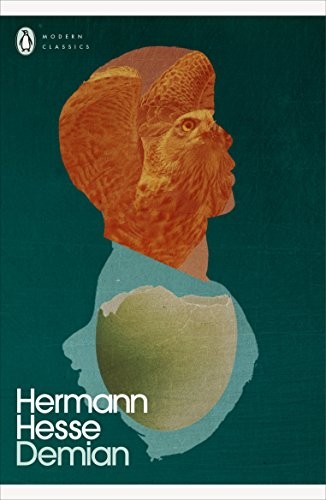

Monologues pose questions on morality and finding meaning within the coming-of-age period--should I cherish the bright world of home and family, or be drawn to the darker world outside that I can't help but be attracted to? The main title, Demian, itself is a friend of Sinclair--the main narrator--who meets along the way and nuances Sinclair's view of settling his inner life.

Of course I was part of the bright and true world—I was my parents' child—but wherever I turned my eye or ear the other world was always there, and I lived in the other world too, even though it often felt like I didn't belong there, in the spooky realm of fear and bad conscience.

At times I even liked the forbidden world best, and often my return to the light, as good and necessary as it might be, felt almost like a turn toward something less beautiful, less exciting, more desolate and dreary. Sometimes I knew that my goal in life was to turn into someone like my father and my mother: so bright and pure, so superior and harmonious. But it was a long, long way to that goal, and along that way you had to sit quietly in school and study and take tests and pass exams, and all the while the path ran right past the other, darker world, or through it, and it was by no means impossible to stay in it, drown in it.

They said that the people with this mark were sinister and unnerving—and so they were. Anyone with courage and character always seems unnerving to others. They felt very uncomfortable having this tribe of fearless, sinister people running around, and so they put a label on them, hung a story around their necks, to get back at them and get some compensation for all the times they had been scared.

My story is not for them. It is meant for people who better understand the human heart. Adults, who have learned to transmute some of their feelings into thoughts, do not see such thoughts in children, so they conclude that the experiences are not there either.

I had tried to walk along the paths of the world, and they had proven too slippery for me. And now that a friendly hand had reached out and saved me, I ran straight back, without looking left or right, into Mother's lap, back to the safety of a pious, sheltered childhood world. I made myself younger, more dependent, and more childish than I really was.

...because I was unable to walk alone, so I chose, in my blind heart, dependence on Father and Mother, on the old beloved "world of light," even though I already knew it was not the only one.

I sometimes felt proud and conceited but just as often demoralized and depressed. There were many times I saw myself as a genius, many times as half insane. I was never able to share and join in the others' pleasures, and I was eaten up with worries and self-hatred about how hopelessly isolated I was from them, how cut off from life.

I, who had been lonely for so long, learned what true community means, the kind that is possible between people who have felt complete and total solitude. Never again did I yearn for the tables of the happy or the feasts of the blessed; never again did envy or longing for the past come over me at the sight of groups of people.

My only certainty was the voice within me, the dream image. I felt a duty to follow its lead, blindly. But it was hard, and every day I rebelled against it again. Maybe I was crazy, I often thought—maybe I was not like other people. . . . Still, I could do everything the others did, without much effort: read Plato, solve trigonometry problems, follow a chemical analysis. There was only one thing I couldn't do: wrest the darkly hidden goal from inside me and see it before me, the way the others did, the ones who knew they wanted to be professors or lawyers, doctors or artists, who knew how long their path would take and what advantages it would bring. That was what I could not do. Maybe I too would become one of those things someday, but how could I know? Or maybe I would search and search for years, and nothing would come of me, I would reach no goal at all. Or maybe I would reach a goal, but it would turn out to be wicked, dangerous, terrible.

As long as we are human, we all make mistakes. And then, as long as our conscience doesn't go numb, the knowledge of the mistakes we have made can't help but cause painful thoughts for all of us.

We have the power to decide on our own who we will be. Therefore, we will make mistakes. However— We have the power to decide on our own who we will be. Therefore, we can also recover from mistakes.

Most people slip into a self-interested way of thinking, become unable to understand the facts of the matter, and end up seeing only that which betters their own circumstances.

The things that you feel most deeply, from the very bottom of your heart, will never deceive you in the slightest. And so at all times, in all things, whatever feelings you may have, consider these carefully. If you do this, then someday, somewhere, a unique, once-in-a-lifetime experience will leave a deep impression on you, and you will come to understand something that has a meaning that is not just limited to that one moment. That thought will be an idea that is truly your own. To put it a slightly more difficult way, you must make a habit of thinking honestly, with your own experience as a foundation...